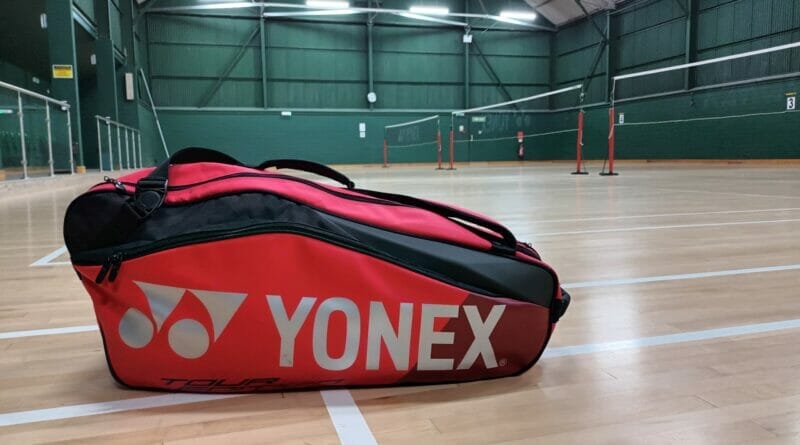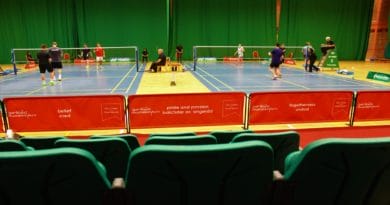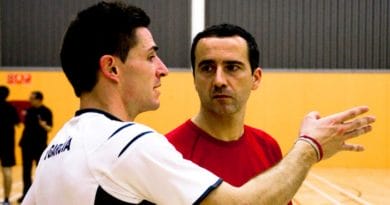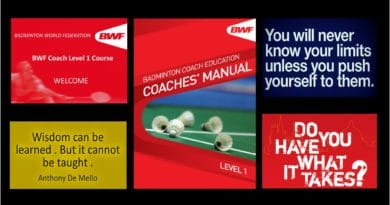My ideal Badminton coach education system
What do I want from a coach education system?
The stimulus, the experiences, the information
Here are my selfish thoughts
They may not suit you
But they are my honest thoughts at this time
I decided to write this after posting a question in the ‘Courtside Conversations’ part of this website.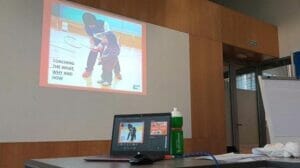
The title is Design Your Own Badminton Coach Education
If you want to challenge yourself or discuss with a group of friends, click on this image. It will give you some questions, challenges and ideas to talk about.
Or send it to a friend who is always criticising and moaning about coach education systems.
– – – – – – – – – – – – – – – – – –
Take a look at my list
Do my suggestions suit your needs?
My ideal system would …
Provide me with stimulus – when and how
Challenge me and test me – how and why
Introduce me to people – connections matter
Allow me to be part of a network – the benefits
Encourage me to explore – give me tools and constraints
Nudge me towards solutions – less telling more ‘waiting for me’
Be full of practical learning- opportunities through action
– – – – – – – – – – – – – – – –
Provide me with stimulus
When I’ve run out of motivation I need stimulus, inspiration, and yes that happens every so often. Do you ever feel the same?
Looking back, I’d say every 2-3 years I feel disillusioned with either my progress as a coach, the lack of opportunities to develop (often I’m just not looking hard enough) or I’m struggling with a coaching problem.
I’ve certainly found that I need some outside stimulus, a coaching spark to get me energised again. This can come in many forms, some of which I hope would be provided by an association or governing body.
I don’t mind where they come from, here are some that certainly have worked.
Does your Association or NGB share these ideas or links with you?
If it’s in blue text and you are interested follow the link
- Being invited to help or watch another coach work – then having a coffee and a chat
- Attending a Coaches Conference or Workshop – here are some online links
- Badminton Insight – watching the weekly videos
- UKCoaching Learning Lab – a monthly webinar aimed at Coach Developers and Coach Assessors
- UKCoaching Coach Development Conversations – monthly, discussing everyday challenges faced by coach developers
- The Sport Psych Show – the podcast series from Dan Abrahams
Rather than just providing information,
could a Badminton coach education system be designed around motivating and stimulating coaches
– – – – – – – – – – – – – – – –
Challenge and test me
My ideal badminton coach education would certainly include some challenges. However, they’d need to have context and apply to the environment I work in.
The closer they are in application and context to my sport or the delivery of effective coaching the better. I’m not a fan of random challenges without there being a usable learning outcome.
That can be difficult in CE courses and often information is presented in a generic one-size-fits-all approach. Plus there is often no discussion of alternative methods and techniques. It’s very easy to sit back and just wait to be ‘told’ information
I enjoy workshop-style learning run by a great facilitator. There the challenges are more about considering what others are proposing. Then ask that question you’ve been wanting to ask on the CE course but couldn’t.
It’s always a challenge when asked to think about what others are doing and why. Hopefully, a workshop will encourage that.
Could a Badminton coach education system be designed to allow open exploration of ‘Practice’?
Would you like an opportunity to ask more?
Examinations and assessments
I’m not a fan, but I do recognise that they are needed.
My two biggest issues are that very often there is little or no feedback, pass or fail. Secondly, do they really provide a snapshot of someone’s ability? Or do coaches put on an act during the assessment, ensuring they deliver what they believe the assessor wants?
If a qualification needs an assessment I would prefer that to be done through both a written logbook, presentation of ideas, and an interview. All would have feedback from the assessor.
If I was assessing or if I was being assessed, I’d want questions of: Why (tell me), What, When did you decide to do “X”.
To be clear, I’d want to ask the assessor some of these questions in response to their observations. I’d like a 2-way discussion in the assessment!
Even at the 1st award level, I believe there needs to be a part where the coach presents their thoughts and has a discussion with the assessor. The problem, I guess, is that this takes time and money!!
Could there be a way of assessing coaches in the environment they feel comfortable in
and require them to have an opinion/rationale for what they do?
– – – – – – – – – – – – – – – –
Introduce me to people
Imagine a badminton coach education system that as one of its main aims was to increase connections between coaches. How would you feel about that? I’d really like it.
Making connections has been influential in my development as a coach.
I believe that if a CE system was in part founded on the belief that that the ongoing development of coaches was best served by everyone contributing it would produce powerful results. Ok, not everyone will become life-long friends, that’s not the aim.
CE should motivate coaches to make connections, show them what could happen, ask them to participate in small collaboration projects, encourage them to be inquisitive (ask questions) and importantly to take questions.
These themes would certainly produce new learning away from the formal courses and assessments. Working alone will never beat working with a collaborative coaching partner
Could coach education have a core aim of creating connections between coaches?
– – – – – – – – – – – – – – – –
Allow me to be part of a network
 This is similar to the last suggestion but it’s more formal. I’d like a badminton coach education system to actively encourage coaches to meet and interact with others.
This is similar to the last suggestion but it’s more formal. I’d like a badminton coach education system to actively encourage coaches to meet and interact with others.
Creating a feeling of professional belonging. People don’t have to initially share or contribute but feel that they can listen and then interact when ready.
This may be tough for some organisations as generally they ‘educate then forget’. It would have to be a month-to-month accumulation of experiences to enable the coach to feel safe and bring their full collaboration to the group.
I’ve experienced this when organisations have used these 5 pillars to ensure that coaches feel: “welcomed,” “known,” “included,” “supported” and “connected.
Could coach education be seen as just a part of a wider aim of cultivating a community spirit,
establishing shared goals, and fostering open communication?
– – – – – – – – – – – – – – – –
Encourage me to explore – give me tools and constraints
Rather than just have a badminton coach education deliver information, I’d like to experience one that gives me tools to use in the future.
Tools I need to help me
- How to establish what a player needs right now, and in the future – to work progressively and not overload them or me
- Finding different ways (methodologies) to coach the same thing
- To understand and question the things I see on Social Media – not everything is effective, is it?
- To identify why practice doesn’t seem to be translating into competition
- Select a coaching action from a list of possibilities – understanding that I may have more thoughts ‘not used’
I’d also like some CE advice (help) on how to ‘constrain’ my coaching and thoughts
- Understanding that maybe I do not have the skills to ‘invent’ a great new practice
- I must seek and try out new ways (to me) when coaching if I haven’t already (how to balance this with the one above)
- To balance both participation and performance in sessions
Could coach education ever be a tool and information-providing experience?
Tools 1st, information 2nd (?)
– – – – – – – – – – – – – – – –
Nudge me towards solutions – less telling more ‘waiting’
When I started coaching I most often coached the way I’d been coached. Then I moved to delivering the way I’d been shown on my first CD qualification. I had very little indecision in my actions, I just ‘coached’ the way I thought it had to be done!
It was a few years before I realised that I wasn’t really coaching, I was just delivering practices. However some players did seem to improve, but not all and not as effectively as I liked.
I needed someone to suggest and nudge me towards solutions. Skilfully showing me how it could be, where to direct my coaching attention and what to consider or not consider.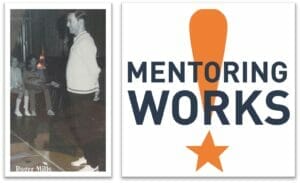
Luckily I found that person before I got bored and before I started to invent new ways of coaching practice. He not only nudged me but expertly demonstrated his suggestions through real-world sessions (practical examples in practice).
All the suggestions he gave were right in front of me, he challenged me to observe and ask questions. I didn’t see everything as in the beginning much was a subtle coaching action. I struggled to see why he was so effective.
However, in time the discussions and observation allowed me to understand more.
I was encouraged to consider what I was observing and nudged towards different solutions. Less telling more waiting for me to question or comment.
How well do current coach education system use mentors, and how effective is the process?
– – – – – – – – – – – – – – – –
Be full of practical learning opportunities through action
Do you agree that above all else effective coach development is best provided by the coach ‘doing’, reflecting (sometimes with assistance) and ‘doing again.
It’s a lifelong process and the more a coach develops, it continues, Level 3 or 4 isn’t the end of your development!
I’d like a system to have a goal that all information needs to be presented in a practical environment
Even something such as ‘Learning Styles’ (if they actually exist?!) should be presented through practical application on court. As much as possible information should be shown by practical teaching, how it works, how it can be used on the court, and in what situations it isn’t as effective.
Classroom and prior learning are important and required, but that isn’t the end of the learning. To show how things work in practical situations is vital. Classroom to court cannot be underestimated!
Hopefully, the idea that “some things work some of the time, but not everything works all of the time” can be experienced on court under the guidance/assistance of others.
Maybe this would challenge the notion that any practice is worthwhile, especially if ‘World -class players do it’
Helping coaches understand what makes an effective practice and how to reflect and analyse what needs to be at the heart of a CE system. It’s certainly easier to demonstrate all this on court rather than in a classroom.
Could coach education systems present more concepts/information on court but
crucially show why some things work some of the time, but not everything works all of the time”
– – – – – – – – – – – – – – – –
You may agree with my thoughts about what makes the perfect Badminton coach education system or maybe you won’t. Especially as they include some aspects that are constantly under review and sometimes changing.
However much of the above I still wish that I’d had years ago.
Designing a Coach Education system isn’t easy
But would you like one with some of the ideas above?

As always, I’m very grateful if you have read this far 🙂
If you’ve had a conversation with a friend, especially about this topic why not share some and send me an email contact@badmintonandy.com
I’d welcome any ideas for topics and conversation starters.

